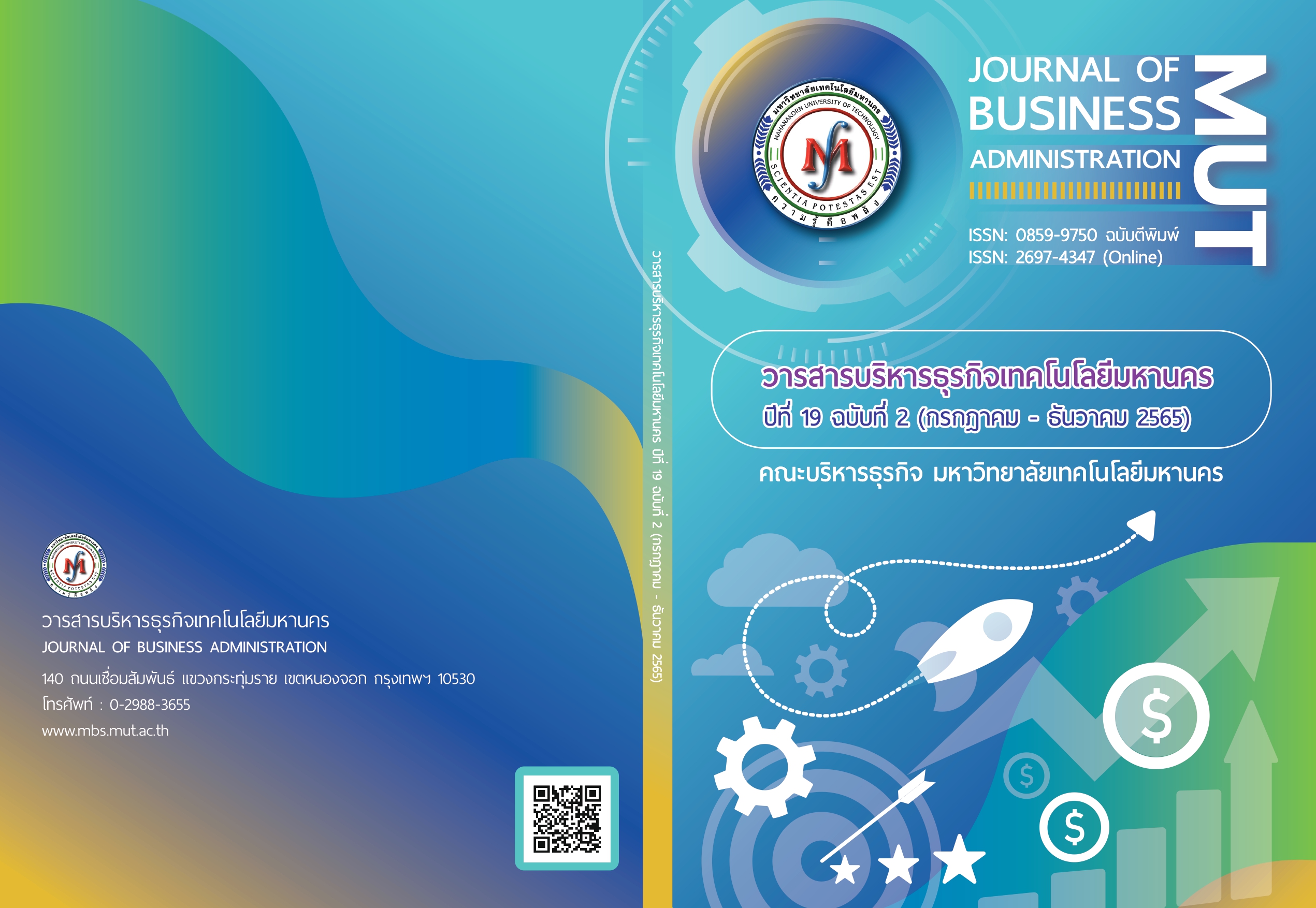ปัจจัยเชิงสาเหตที่มีอิทธิพลต่อพฤติกรรมเชิงนวัตกรรมของพนักงาน องค์กรปกครองส่วนท้องถิ่นจังหวัดสกลนคร
คำสำคัญ:
ภาวะผู้นำการเปลี่ยนแปลง, การรับรู้ความยุติธรรมในองค์การ, ความผูกพันในงาน, ความ ไว้วางใจต่อองค์การ, พฤติกรรมเชิงนวัตกรรมบทคัดย่อ
การวิจัยครั้งนี้มีวัตถุประสงค์ คือ 1) เพื่อศึกษาระดับ ของปัจจัยเชิงสาเหตุได้แก่ ภาวะผู้นำการ
เปลี่ยนแปลง การรับรู้ความยุติธรรมในองค์การ ความผูกพันในงาน ความไว้วางใจต่อองค์การ และ
พฤติกรรมเชิงนวัตกรรม 2) เพื่อศึกษาอิทธิพลของปัจจัยเชิงสาเหตุทื่ส่งผลต่อพฤติกรรมเชิงนวัตกรรม
3) เพื่อศึกษาข้อเสนอเชิงนโยบายการพัฒนาพฤติกรรมเชิงนวัตกรรม ใช้ระเบียบวิธีวิจัยแบบผสานวิธี
สุ่มตัวอย่างแบบแบ่งชั้น กลุ่มตัวอย่างเป็นพนักงานองค์กรปกครองส่วนท้องถิ่นจังหวัดสกลนคร จ านวน
293 คน เครื่องมือประกอบด้วยแบบสอบถาม และแบบสัมภาษณ์กึ่งมีโครงสร้าง สถิติประกอบด้วย
ค่าเฉลีย ส่วนเบี่ยงเบนมาตรฐาน ค่าสัมประสิทธิ์สหสัมพันธ์ค่าสัมประสิทธิ์สหสัสพันธพ์หุคูณ และการ
วิเคราะห์เส้นทาง ผลการศึกษาพบว่า ภาวะผู้น าการเปลี่ยนแปลงอยู่ในระดับมาก การรับรู้ความ
ยุติธรรมในองค์การอยู่ในระดับมาก ความผูกพันในงานอยู่ในระดับมาก ความไว้วางใจต่อองค์การอยู่ใน
ระดับมาก และพฤติกรรมเชิงนวัตกรรมอยู่ในระดับมาก ภาวะผู้นำการเปลี่ยนแปลงมีอิทธิพลทางตรงต่อ
พฤติกรรมเชิงนวัตกรรมอย่างมีนัยสำคัญทางสถิติ การรับรู้ความยุติธรรมในองค์การไม่มีอิทธิพลต่อ
พฤติกรรมเชิงนวัตกรรม ความผูกพันในงานมีอิทธิพลทางตรงต่อพฤติกรรมเชิงนวัตกรรมอย่างมี
นัยสำคัญทางสถิติ ความไว้วางใจต่อองค์การมีอิทธิพลทางตรงต่อพฤติกรรมเชิงนวัตกรรมอย่างมี
นัยสำคัญทางสถิติ ภาวะผู้นำการเปลี่ยนแปลงมีอิทธิพลทางตรงต่อความผูกพันในงานอย่างมีนัยสำคัญ
ทางสถิติ การรับรู้ความยุติธรรมในองค์การมีอิทธิพลทางตรงต่อความผูกพันในงานอย่างมีนัยสำคัญทาง
สถิติ ภาวะผู้น าการเปลี่ยนแปลงมีอิทธิพลทางตรงต่อความไว้วางใจต่อองค์การอย่างมีนัยสำคัญทาง
สถิติ การรับรู้ความยุติธรรมในองค์การมีอิทธิพลทางตรงต่อความผูกพันในงานอย่างมีนัยสำคัญทาง
สถิติ ภาวะผู้น าการเปลี่ยนแปลง และการรับรู้ความยุติธรรมในองค์การ มีอิทธิพลทางอ้อมต่อพฤติกรรม
เชิงนวัตกรรม โดยส่งผ่านความผูกพันในงาน และความไว้วางใจต่อองค์การ ปัจจัยอิทธิพลเชิงสาเหตุทั้ง
ระบบทำานายพฤติกรรมเชิงนวัตกรรมได้ร้อยละ 84.60 ข้อเสนอเชิงนโยบายเสนอแนะให้พัฒนาระบบ
การบริหารองค์การ ระบบการพัฒนาพนักงานแบบองค์รวม แนวปฏิบัติส าหรับผู้บริหาร และแนว
ปฏิบัติการพัฒนาตนเองของพนักงาน
เอกสารอ้างอิง
Agarwa, A. U. 2014. Linking justice, trust and innovative work behavior to work engagement.
Personnel Review. Vol. 43 No. 1. 41 - 73.
Banchirdrit, S. 2021. New Normal of Human Resource Management in Business Sector in
Post – Covid-19. Journal of Research and Development Institute, Rajabhat Maha
Sarakham University. Vol. 8. No. 2. 45 – 59.
Bandura, A. 1977. Self-efficacy: toward a unifying theory of behavioral change. Psychological
review. Vol. 84. No. 2. 191 - 208.
Bass, B. M. and Avolio, B. J. 1994. Improving organizational effectiveness through
transformational leadership. Newbery Park CA: sage.
Chumkesornkulkit, P. and Na Wichian, S. 2018. Innovative work Behavior: Concept,
Antecedents and Challenges. Journal of Behavioral Science for Development
(JBSD). Vol. 10. No. 1. 25 – 41.
Cui, Y. and Jiao, H. 2019. Organizational justice and management trustworthiness during
organizational Change: Interactions of Benevolence, Integrity, and managerial
approaches. Information Processing and Management. Vol. 56. 1526 – 1542.
De Jong, J. P. J. and Den Hartog, D. N. 2010. Measuring Innovative Work Behavior.
Creativity and Innovation Management. Vol. 19. 23 – 36.
Dick, V. R. et al. 2018. Identity leadership going global: Validation of the Identity Leadership
Inventory across 20 countries. Journal of Occupational and Organizational
Psychology. Vol. 91. 697 – 728.
Elrehail, H. Emeagwali, O. L. and Alsaad, A. 2018. The impact of Transformational and
Authentic leadership on innovation in higher education: The contingent role of
knowledge sharing. Telematics and Informatics. Vol. 35. 55 – 67.
Folger, R. and Cropanzano, R. 1998. Organizational justice and Human Resource
Management. California: Sage.
Gemeda, H. K. and Lee, J. 2020. Leadership styles, work engagement and outcomes among
information and communications technology professionals: A cross-national study.
Heliyon. Vol 6. e036992.
Hair, J. F., Black, W. C., Babin, B. J., Anderson, R. E., and Tatham, R. L. 2006. Multivariate
data analysis (Vol. 6). Upper Saddle River, NJ: Pearson Prentice Hall. Google
Scholar.
Ilyas, S. Abid, G. and Ashfaq, F. 2020. Ethical leadership in sustainable organizations: The
moderating role of general self-efficacy and the mediating role of organizational trust.
Sustainable Production and Consumption. Vol. 22. 195 – 204.
Imran, R. 2019. High Performance Work System, Job Engagement and Innovative Work
Behavior: An Exploration in Omani Context. Proceedings of the 2019 2nd
International Conference on Computers in Management and Business. 24 – 28.
Jena, L. K. Pradhan, S. and Panigrahy, N. P. 2018. Pursuit of organisational trust: Role of
employee engagement, psychologicall well - being and transformational leadership.
Asia Pacific Management Review. Vol. 23. 227 – 234.
Jituea, N. and Jadesadalug, V. 2018. Perceived Organizational Justice on Creativity Work
Behavior and Innovation work Performance: The Mediating Effect of Affective
Commitment of Lecturer at Rajamangala University of Technology Thanyaburi.
Phuket Rajabhat University Academic Journal. Vol. 14. No 2. 349 - 380.
Kim, W. and Park, J. 2017. Examining Structural Relationships between Work Engagement,
Organizational Procedural Justice, Knowledge Sharing, and Innovative Work Behavior
for Sustainable Organizations. Sustainability. Vol. 9 No. 205. doi:10.3390/su9020205
King, N. and West, M. A. 2002. Experiences of Innovation at work. Journal of Managerial
Psychology. Vol. 2. No. 3. 6 – 10.
Kmieciak, R. 2020. Trust, knowledge sharing, and innovative work behavior: empirical
evidence from Poland. European Journal of Innovation Management.
DOI:10.1108/EJIM-04-2020-0134
Koednok, S. and Sungsanit, M. 2018. A Causal Model of Innovative trust on Innovative Work
Behavior: The Mediating Role of Employee Work Passion. Human Resource and
Organization Development Journal. Vol. 10. No. 2. 33 – 57.
Kumsrisook, T. and Wongwattanapong, K. 2022. Barriers in Personnel Management of Local
Government Organizations. Journal of Roi Kaensarn Academi. Vol. 7. No 1.
- 386.
Latan, H. 2014. The Role of Organizational Justice, Trust and Commitment in a Management
Control System (MCS) - Gain Sharing. International Journal of Accounting and
Financial Reporting. Vol. 4 No. 2. 185 - 200.
Li, H. Sajjad, N. Wang, Q. Ali, A. M. Khaqan, Z. and Amina, S. 2019. Influence of
Transformational Leadership on Employees’ Innovative Work Behavior in Sustainable
Organizations: Test of Mediation and Moderation Processes. Sustainability. Vol 11.
Issue 1594. doi:10.3390/su11061594
Martins Marques De Lima Rua, Manuel, O., Araujo, C., Manuel, J. 2016. Linking
transformational leadership and organizational trust: has organizational commitment a
mediating effect on it?. Cuadernos de Gestion. Vol. 16. No. 1. 43 – 61.
Meng, J. and Berger, K. B. 2019. The impact of Organizational culture and leadership
performance on PR professionals’ Job satisfaction: Testing joint mediating effect of
engagement and trust. Public Relations Review. Vol. 45. 64 - 75.
Miles, M. B. and Huberman, A. M. 1994. Qualitative data analysis: An expanded
sourcebook: Sage Publications.
Mohammed, A. K. Alaa S. J. and Ahmad, A. R. 2019. The Impact of Organizational Justice
Dimensions on Organizational Commitment among Bank Employees. International
Journal of Psychosocial Rehabilitation. Vol. 23 No. 2. 501 - 513.
Muangamporn, N. 2018. The driving innovative in government organizations(M.P.A,
D.P.A.) Retrived December 30, 2021 from http://rcim.rmutr.ac.th/?p=11572
Mushtaq, R. Ellahi, A. and Khan, M. B. 2019. Influence of Organizational Justice, Supervisor
Support, and Group Cohesiveness on Organizational Commitment: Mediated Role of
Ethical Behavior. Pakistan Journal of Psychological Research. Vol. 34. No. 4. 919
– 934.
Nastasi, B. K. and Schensul, S. L. 2005. Contributions of qualitative research to the validity
of intervention research. Journal of School Psychology. Vol. 43. No. 3. 177 - 195.
Ogwuche, C. H. Urama, D. A. and Nyam, J I. 2019. Influence of Organizational culture and
justice on employee job performance among private organization in Makurdi
Metropolis. IFE PsychologIA : An International Journal. Vol. 27. No. 1. 36 - 44.
Page, D. 2018. Identifying Leadership Behaviors, Engagement, and Innovative work
behavior in Health care. Dissertation. Doctor of Education in Interdisciplinary
Leadership. Graduate School of Creighton University. Omaha, NE, USA.
Pojsupap, T.; Khasasin, R.; Kongtanasamut, P. and Prachuabmoh, A. 2020. A synthesis of the
theories in innovative behavior. Modern Management Journal. Vol. 18. No. 1. 1 – 14.
Rajabi, M. Abdar, Z. E. and Agoush, L. 2017. Organizational Justice and Trust Perceptions: A
Comparison of Nurses in public and private hospitals. WORLD FAMILY
MEDICINE/MIDDLE EAST JOURNAL OF FAMILY MEDICINE. Vol. 15 No. 8. 205 -
Schaufeli, W.B., Salanova, M., Gonzalez-Roma, V. and Bakker, A.B. 2002. The measurement
of engagement and burnout: a confirmative analytic approach. Journal of Happiness
Studies. Vol. 3. 71 - 92.
Shaw, R. B. 1997. Trust in the balance: Building successful organizations on results,
integrity and concern. San Francisco: Jossey-Bass Publishers.
Specht, D. A. 1975. On the evaluation of causal models. Social Science Research. Vol. 4.
No. 2. 113 – 133.
Taghipour, A., and Dezfuli, Z. K. 2013. Innovative behaviors: Mediate mechanism of
job attitudes. Procedia - Social and Behavioral Sciences. Vol. 84. 1617 - 1621.
Teepapa, T. 2020. The Relationship Between Employee Envelopment, Employee Engagement
and Innovative Work Behavior and Mediating role of Organizational Context of
Employees in Thai Organization. Journal of Suvarnabhumi Institute of Technology
(Humanities and Social Science). Vol. 6. No. 2. 224 – 241.
Uriesi, S. 2019. Organizational justice and trust in managers as factors of organizational
commitment. Psychology Series. Vol. 28. 57 – 66.
Wiratchai, N. 1999. Structural equation model (LISREL) statistical analysis for Research in
the Social Sciences and Behavioral sciences. 3th ed. Bangkok: Chulalongkorn
University.
Wongtongluea, P. 2017. Factors Affecting the Innovative Work Behavior of Employees and
Guidelines for the Enhancement of Small and Medium Enterprises in the Food
Industry: A Mixed Methods Research. Doctor of Philosophy Dissertation (Applied
Behavioral Science Research). Srinakharinwirot University.
Xie, Y. 2018. Leadership style and innovation atmosphere in enterprises: An empirical study.
Technological Forecasting and Social Change. Vol. 135. No. 10. 257 – 265.
Yamane, T. 1973. Statistics: an introductory analysis. New York: New York: Harper and
Row.
Yue, C. A. Men, L. R. Ferguson, M. A. 2019. Bridging transformational leadership, transparent
communication, and employee openness to change: The mediating role of trust.
Public Relations Review. Vol. 45. 1017792.
ดาวน์โหลด
เผยแพร่แล้ว
ฉบับ
ประเภทบทความ
สัญญาอนุญาต

อนุญาตภายใต้เงื่อนไข Creative Commons Attribution-NonCommercial-NoDerivatives 4.0 International License.
ข้อความ ข้อคิดเห็น ข้อมูล เนื้อหา รูปภาพ แผนภูมิ แผนผัง เป็นต้น ที่ปรากฏและแสดงในบทความต่างๆ ในวารสารบริหารธุรกิจเทคโนโลยีมหานคร ถือเป็นความรับผิดชอบโดยตรงของผู้เขียนบทความนั้นๆ มิใช่เป็นความรับผิดชอบใดๆ ของวารสารบริหารธุรกิจเทคโนโลยีมหานคร และมหาวิทยาลัยเทคโนโลยีมหานคร
บทความที่ตีพิมพ์ในวารสารบริหารธุรกิจเทคโนโลยีมหานคร ถือเป็นลิขสิทธิ์เฉพาะของคณะบริหารธุรกิจ มหาวิทยาลัยเทคโนโลยีมหานคร หากบุคคลหรือหน่วยงานใดต้องการนำทั้งหมดหรือส่วนใดส่วนหนึ่งไปเผยแพร่ต่อหรือเพื่อกระทำการใดๆ จะต้องได้รับการอนุญาตเป็นลายลักษณ์อักษรจากคณะบริหารธุรกิจ มหาวิทยาลัยเทคโนโลยีมหานครก่อนเท่านั้น


